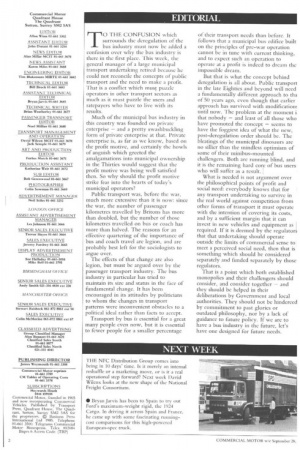EDITORIAL
Page 4

If you've noticed an error in this article please click here to report it so we can fix it.
T0 THE CONFUSION which surrounds the deregulation of the bus industry must now be added a confusion over why the bus industry is there in the first place. This week, the general manager of a large municipal transport undertaking retired because he could not reconcile the concepts of public transport and the need to make a profit. That is a conflict which must puzzle operators in other transport sectors as much as it must puzzle the users and ratepayers who have to live with its results.
Much of the municipal bus industry in this country was founded on private enterprise — and a pretty swashbuckling form of private enterprise at that. Private enterprise is, as far as we know, based on the profit motive, and certainly the howls of anguish which greeted the amalgamations into municipal ownership in the Thirties would suggest that the profit motive was being well satisfied then. So why should the profit motive strike fear into the hearts of today's municipal operators?
Public transport was, before the war, much more extensive than it is now: since the war, the number of passenger kilometres travelled by Britons has more than doubled, but the number of those kilometres travelled on bus or coach has more than halved. The reasons for an effective quartering of the importance of bus and coach travel are legion, and are probably best left for the sociologists to argue over.
The effects of that change are also legion, but must be argued over by the passenger transport industry. The bus industry in particular has tried to maintain its size and status in the face of fundamental change. It has been encouraged in its attitudes by politicians to whom the changes in transport patterns were inconvenient obstacles to a political ideal rather than facts to accept.
Transport by bus is essential for a great many people even now, hut it is essential to fewer people for a smaller percentage of their transport needs than before. It follows that a municipal bus edifice built on the principles of pre-war operation cannot be in tune with current thinking, and to expect such an operation to operate at a profit is indeed to dream the impossible dream.
But that is what the concept behind deregulation is all about. Public transport in the late Eighties and beyond will need a fundamentally different approach to tha of 50 years ago, even though that earlier approach has survived with modifications until now. The problem at the moment i that nobody — and least of all those who have promoted the concept — seems to have the foggiest idea of what the new, post-deregulation order should be. The bleatings of the municipal dinosaurs are no sillier than the mindless optimism of some of their minibus-mounted challengers. Both are running blind, and it is the remaining hard core of bus users who will suffer as a result. I What is needed is not argument over the philosophical points of profit and social need: everybody knows that for any transport undertaking to survive in the real world against competition from other forms of transport it must operate with the intention of covering its costs, and by a sufficient margin that it can invest in new vehicles and equipment as required. If it is deemed by the regulatorS that that undertaking should operate outside the limits of commercial sense to meet a perceived social need, then that is something which should be considered separately and funded separately by those regulators.
That is a point which both established monopolies and their challengers should consider, and consider together — and they should be helped in their deliberations by Government and local authorities. They should not be hindereed by commitment to past glories or outdated philosophy, nor by a lack of guidance to future policy. If we are to have a bus industry in the future, let's have one designed for future needs.




























































































